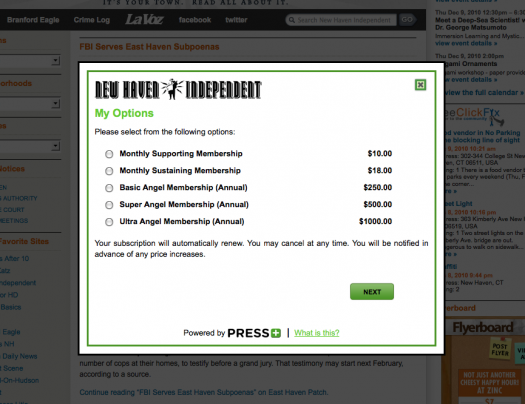
Spotted…
This is one in an on-going series of stories about innovation in community news.
Click here to read more.
Steven Brill is a man intent on putting toothpaste back in the tube, as he put it, one dab at a time.
News publishers “committed mass suicide,” said Brill, when they began giving away content for free on the World Wide Web more than a decade ago.
The serial media entrepreneur’s newest venture, Press+, is offering publishers of today’s news sites a chance to reverse that practice and begin collecting for their content. His solution is designed to encourage a reader to pay after consuming a set amount of content.
“It’s not a pay wall,” he was quick to note. “We don’t even allow use of the term pay wall in our office. It’s always a metered approach.”
What differentiates this from walled-off content is that the payments are optional. Instead of blocking stories entirely, a box pops up asking for a donation. If readers decline, they can continue reading.
The Knight Foundation funded a Press+ trial on 10 sites as part of its efforts to explore sustainability models. Local sites like the New Haven Independent are participating in that program, which is no longer accepting applications. While larger organizations, like the nonprofit investigative site ProPublica, are beginning to try out the system, too.
By the start of December 2010, just a dozen sites had Press+ installed, with another 10 to 13 set to come online by the end of the year. Brill said that he had letters of intent from media groups that represent more than 1,600 sites.
How It Works
On sites using the Press+ service, once a reader passes a certain number of pages per month, generally 10 or 20, a pop-up window asks for a contribution, or an offer to become a sustaining member of the site.
The program can be customized and targeted so a site could, for example, reach people who read a significant number of education stories and ask them to contribute to specifically support education reporting.
Readers register in a Press+ pop-up window, without leaving the news site, and a subscriber’s contact information is shared with the publisher. On a daily basis, Press+ provides reports on the donations that come in each day, and analytics reports on how many users are seeing various funding requests each day.
As a result of the network Brill is developing, a media group that owns a number of sites could allow a customer to subscribe to all of them at once. Press+ would recognize the user as the person visits the various sites.
Press+ collects the reader’s money and registration information, and then passes all contact information and statistics to the sites on a daily basis. Press+ charges news sites a $2,500 set-up fee and then takes 20 percent of the revenue generated through its tool, before passing the rest on to the sites at regular intervals based on agreements with the sites.
That could be a significant and easy source of revenue for sites, said Brill. For each new site, his company does “extensive modeling” that highlights potential revenue.
In his grand vision, you could network legacy news sites and news entrepreneurs. But Brill does not have his sights set on leveraging this network of sites to sell advertising across sites. He noted that some publishers might be able to increase ad rates by knowing more about their readers’ habits.
“A lot of these sites don’t have business staff,” noted Brill. “To me, this is the ultimate, ultimate no-brainer, but you’d be surprised by the number of people who say, ‘Gee, will our readers be offended by it?’”
First Sites Launch
Press+ adds an overlay to an existing site, such as the New Haven Independent. A reader can either go through the donation process or click ‘X’ to reduce the box and read the story in full.
It did not take much to convince Paul Bass, editor of the New Haven Independent. “It’s a pretty interesting idea,” he said. The company formed in April 2009, and after 18 months, a dozen news sites had installed Press+.
The New Haven Independent consistently experiments with a number of revenue streams, including selling legal notices, seeking foundation support, charging for self-service community announcements, and sustaining members.
Bass agreed to give Press+ a try, in part because of the Knight funding. Knight offered to cover the $2,500 set-up fees for 10 non-profit news sites to experiment with the platform. (Disclosure: J-Lab is Knight Foundation grantee.)
Bass has followed Brill’s career for decades, and describes Brill as one of the visionary minds in the industry. “I’m glad he’s joined the hunt for revenue and it’s exciting to ride on his coattails for a minute.”
Has Press+ brought in money in the first few weeks? “You have to wait a while,” to see results, Bass added.
Brill points out that once the first five or so publications launched, others recognized how the system worked and began making progress on implementing Press+ on their sites.
In the case of ProPublica, he said the investigative news site had collected “several hundred [dollars] in donations in the first day.” A representative of ProPublica said it was too early for the organization to make any judgments on the success of the service.
Press+ will not name other sites using the service under the Knight funding, citing non-disclosure agreements. The service is in use on GlobalPost, the Institute for War and Peace Reporting, the Hickory Record in North Carolina, and the Commercial Dispatch in Mississippi, among others.
In December 2010, Press+ also announced plans to work with college newspapers to identify and attempt to register readers, perhaps parents and alumni, from outside the school’s immediate readership area.
There’s no shame in asking for support, notes Brill. “Especially if you’re just asking people to make a contribution, you shouldn’t be embarrassed or even apologetic,” he stressed. “You’re doing this for the community.”
